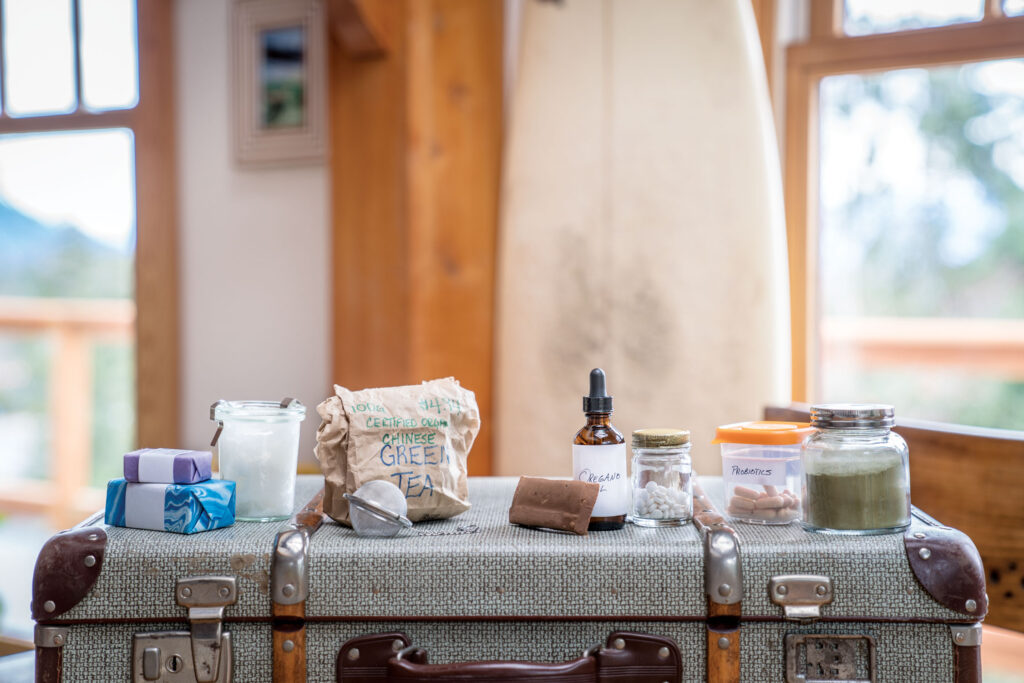Advertisement
Healthy Trails
11 essentials to keep you on your wellness way

There’s nothing like a vacation for relaxation and revitalization. But while you may be taking a break from your routine, your health should never take a backseat. Don’t leave home without the 11 healthy travel essentials on this list.
Advertisement
1. To boost immunity and ease digestion
“The number one supplement I recommend while travelling is a good probiotic,” says Tasreen Alibhai, ND and medical director of Vitalia HealthCare in Vancouver. Alibhai advises finding a probiotic that’s stable at room temperature, which is easier for travel. Take it one to two weeks before you leave, as well as while you’re on your trip.
Advertisement
2. For jet lag
It can take us several days to acclimatize to a new time zone, but taking melatonin as a supplement may help “reset” our sleep-wake cycle, reducing symptoms of jet lag. To sleep soundly on your first night, Alibhai suggests basking in daytime bright light upon arriving at your destination and taking a melatonin supplement before bed. She adds that drinking water and avoiding alcohol on your first night can also help you slumber.
Advertisement
3. To maintain your beauty regimen
David Suzuki’s Queen of Green and wilderness guide Nikki Sanchez advises packing coconut oil in a glass jar—which can double as a reusable cup once you’ve finished the oil—to use as a multipurpose beauty tonic. The oil can be used as a moisturizer, while shaving your legs, in your hair to tame frizz, or as a lip balm.
Advertisement
4. For energy and nutrients
Veggies can be a rare find on the road. Alibhai suggests finding a greens supplement that tastes good; blends easily into water; contains all organic ingredients; and delivers extras such as probiotics, fibre, enzymes to ease digestion, and antioxidants such as green tea extract.
Advertisement
5. To soothe stress
Take some ashwagandha. Studies suggest ashwagandha, or “Indian ginseng,” may be useful as a stress reliever. It’s commonly available as a powder or in pill form at many natural health retailers.
Advertisement
6. For warding off colds, flus, and digestive ailments
It’s no surprise that air travel can increase our risk of contracting illness. “Oregano oil is a strong antibacterial and antifungal agent. It tastes nasty, but it works!” says Alibhai. The oil is widely available as a liquid or in pill form. However, don’t use the oil while pregnant, or give to infants or children.
Advertisement
7. For hydration and nourishment
The air onboard a plane is dry—it can range from about 10 to 20 percent humidity—and we’re trapped in close quarters with others who may be sick. Stow a water bottle and vitamin C in effervescent powder form in your carry-on to rehydrate and give yourself a nutrient top-up in one sip.
Advertisement
8. For disease prevention
Keep mosquitoes and other insects at bay with essential oils like citronella, peppermint, and thyme, suggests Alibhai. After applying a test patch, add diluted oils to your moisturizer or put a few drops into water and spray onto your skin. Also, before you go, visit a travel medicine clinic to ensure you receive the necessary vaccines for your destination.
Advertisement
9. To avoid sunburn
For the sunburn-prone, or those travelling to a hot destination, pack some natural, mineral sunscreen. Plus, new research suggests the polyphenols from green tea may help protect us against UVB ray-induced skin cancer, so it doesn’t hurt to have a cup of green tea while you’re at it.
Advertisement
10. For satiety while travelling
Reach for a protein bar, but don’t just grab and go: some bars have as much sugar and saturated fat as a candy bar from a vending machine. For a nutritionally sound choice, choose a bar with less than 5 g of fat, at least 3 g of fibre, and 15 g or more of protein.
Advertisement
11. To keep clean
Sanchez swears by castile bar soap as a face wash, shampoo, and body wash. “[It’s a] fantastic nontoxic all-around beauty essential. It’s really easy to find fair trade, vegan options for castile,” says Sanchez. Bring a metal tin to stow it in, as the bar gets sticky when wet.
Travelling with allergies
If someone in your family has serious allergies, be sure to inform inflight staff about the details.
Travelling with kids?
Tips and tricks for reducing the wiggles of small wayfarers
Cameron Wears, father of two, and—along with his wife, Nicole—author of the family travel blog Traveling Canucks suggests the following.
- Pack easily prepared foods such as oatmeal for backup when food isn’t available. Also, pack treats the kids wouldn’t normally have at home. These can be used as leverage to keep kids still during pre-boarding or when the seatbelt sign is on.
- Before the trip, purchase toy animals, race cars, and puzzles to reward good behaviour. “That might keep them busy for 20 to 30 minutes,” says Wears.
- Give your kids their own luggage decorated with their favourite character and let them pack it with items including stuffies, cars, books, and noise-control headphones. Tuck the bag under the seat for easy access during plane travel.





